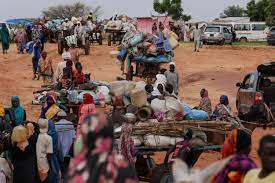Dr. Abdellatif El-Menawy
In the early 1990s, Rwanda witnessed a brutal civil war that resulted in the loss of approximately 800,000 lives. This tragic conflict unfolded between the Tutsi and Hutu tribes, with the Rwandan armed forces, representing the government, pitted against the rebel Rwandan Patriotic Front. The aftermath of this devastating war left Rwanda, a country renowned for its stunning natural landscapes and remarkable biological diversity, in a prolonged state of suffering.
While closely following the ongoing conflict in Sudan, thoughts of Rwanda resurfaced. Various questions crossed my mind: Was this due to the similarities in the circumstances, with the conflict being between a regular force and a rebel party? Perhaps it was because both are African countries located in close proximity. Could it be influenced by Sudan’s Arab identity? Or is it a fear that Sudan may face a fate similar to Rwanda? The alarming crisis propelling Sudan toward a potential replication of Rwanda’s tragedy is the decision by the Sudanese army, under the leadership of Abdel Fattah Al-Burhan, to arm its citizens. This move saddened me deeply. I now anticipate scenes of Sudanese bloodshed as a consequence of power struggles between influential factions, many of them associated with political Islam groups. The focus has shifted away from the well-being of the Sudanese people to a singular emphasis on power and influence.
Interestingly, this arming initiative is concentrated in specific states in the north and east of Sudan, creating an atmosphere where safety appears forbidden. Termed “armed popular resistance,” the process aims to defend citizens in these regions from potential clashes between the army and the Rapid Support Forces, echoing incidents in places like Wad Madani in the state of Al-Jazirah. The decision to arm citizens raises significant concerns. There is no logical justification for such a move. Claims that it aims to counter the advance of the Rapid Support Forces overlook the peril of steering the country into a civil war. This decision, if correctly interpreted, suggests an attempt by the army to regain control of states that are slipping away, indicating a failure in their initial confrontation with the Rapid Support Forces after nearly nine months of conflict.
Sudan is witnessing the dominance of a combative doctrine influenced by Islamist tendencies. Almost all parties emphasize mobilizing citizens to defend their ideologies, irrespective of their appropriateness for the Sudanese masses. This trend is formulating a dangerous recipe for a civil war, pitting citizens against one another. The situation in Sudan has become unbearable, with reports indicating more than 12,000 casualties, 7.3 million displaced and the collapse of political, social and medical services. More than 24 million out of the original 46 million population are now at risk and in desperate need of help. Humanitarian aid efforts have faltered amid increased violence and displacement, with both conflicting parties primarily focused on exploiting the war for their own gains.
While the international community is engrossed in conflicts like the Gaza war and the Russia-Ukraine conflict, Sudan’s dire situation has been overlooked. Urgent humanitarian aid and mediation are essential to end the war and restore normality. The looming fear of a Rwandan scenario arises when considering the failure of Sudan’s healthcare system. Cholera, measles, dengue fever and food insecurity are spreading at alarming rates. It is becoming increasingly clear that, if guns and bombs do not claim Sudanese lives, the collapse of the healthcare system and lack of medical supplies will.
The international community and relief organizations, mandated to address global conflicts and crises, must intervene to impose peace in Sudan and focus on restoring life. Relying on often unsuccessful negotiations is insufficient. Recent negotiations reflect the internal discord within Sudan. Gen. Mohammed Hamdan Dagalo, commander of the Rapid Support Forces, agreed to participate in the Intergovernmental Authority on Development summit in Entebbe, Uganda, last month. However, the Sudanese Sovereignty Council, led by army commander Al-Burhan, refused to attend, asserting that Sudan’s situation is an internal matter. This discord impedes efforts to find a peaceful resolution.
Al-Burhan and his supporters appear unwilling to entertain reconciliation with the Rapid Support Forces, projecting an image of victory or imminent victory. The reality contradicts this narrative, with battles ongoing and the army’s continued attacks failing to achieve peace and stability. Al-Burhan’s call for classifying the Rapid Support Forces as a terrorist organization raises concerns about the worsening humanitarian situation for Sudanese citizens. It is crucial to emphasize that this critique is not directed solely at Al-Burhan, nor is it a defense of Dagalo. The focus is on defending the Sudanese people who are suffering immensely from a war they did not initiate.
Amid the chaos, voices advocating for peace and an end to the war emerge. The Coordination of Civil Democratic Forces (Taqaddum) seeks collaboration among political forces to halt the conflict. Letters have been sent to various parties, including the Sudan People’s Liberation Movement, the Sudan Liberation Movement, the Communist Party and the Baath Party. Internal movements like these are essential, but Sudan also requires support from external sources, preferably from Arab nations, to prevent a prolonged conflict and avert a fate similar to Rwanda’s tragic history. The hope is for a swift resolution to ensure Sudan does not become the next Rwanda.







